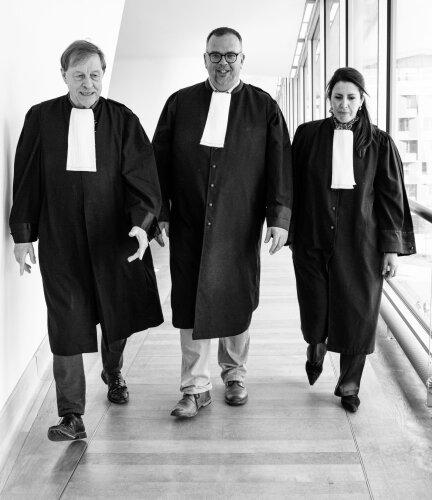Best Renewable & Alternative Energy Lawyers in Antwerp
Share your needs with us, get contacted by law firms.
Free. Takes 2 min.
List of the best lawyers in Antwerp, Belgium
About Renewable & Alternative Energy Law in Antwerp, Belgium
Antwerp, as one of Belgium's most dynamic economic regions, is playing an active role in the country’s transition to renewable and alternative energy sources. These sources include solar, wind, biomass, hydroelectric, and geothermal energy. Due to the port of Antwerp's strategic importance and the city’s industrial character, there is a growing emphasis on reducing reliance on fossil fuels, promoting energy efficiency, and investing in clean energy technologies. Belgian federal and Flemish regional governments have established various regulations, incentives, and targets to foster the growth of renewables. Legal requirements in Antwerp reflect both national laws and specific Flemish energy policies that guide project development, grid access, environmental impact, planning permissions, and subsidies.
Why You May Need a Lawyer
Legal advice can be an invaluable resource in the renewable and alternative energy sector. Projects and investments are governed by an array of complex regulations that can be challenging to navigate, especially for those unfamiliar with Belgian and Flemish legal frameworks. You may need a lawyer if you are:
- Starting or expanding a renewable energy project, such as a solar park, wind farm, or biomass plant
- Seeking permits or navigating local planning and zoning regulations
- Pursuing incentives, subsidies, or other forms of government support
- Negotiating contracts for the sale, purchase, or distribution of renewable energy
- Dealing with disputes, liability issues, or compliance with environmental standards
- Participating in joint ventures, public-private partnerships, or project financing
- Addressing concerns regarding the impact of installations on neighboring properties or communities
- Understanding the rules for connecting to and feeding energy into the public grid
- Acquiring land or property for renewable energy development
- Adhering to European Union directives and ensuring compliance with evolving legislation
Local Laws Overview
Renewable and alternative energy law in Antwerp falls under a combination of Belgian federal, Flemish regional, and municipal regulations. Key legal aspects include:
- Flemish Energy Decree and Energy Order: These set out obligations for renewable energy generation, energy efficiency, and technical requirements for installations.
- Permitting and Environmental Regulations: Projects must generally obtain planning permission and, depending on size, an environmental permit. Public participation and environmental impact assessments may be necessary.
- Grid Connection: Rules govern how renewable energy producers can access and feed power into the distribution or transmission grid. System operators (such as Fluvius and Elia) have their own requirements and application processes.
- Financial Incentives: Flanders offers support schemes such as green certificates, investment subsidies, and tax reductions for certain technologies and projects.
- Building Regulations: New buildings and major renovations must meet minimum energy performance standards and may be required to integrate renewable energy sources.
- EU Directives: Belgium implements EU directives on renewable energy, energy efficiency, and environmental impact assessments, influencing local law and practice.
Frequently Asked Questions
What types of renewable energy projects are most common in Antwerp?
Solar and wind energy projects are the most common, followed by small-scale biomass, heat pumps, and hydroelectric initiatives. Antwerp's port area also sees innovative projects like green hydrogen production.
Do I need a special permit to install solar panels on my property?
Small residential installations usually require notification but not a full permit, while larger installations, especially on commercial buildings or open land, may require planning and environmental permits.
How do I access subsidies or financial support for renewable energy projects?
The Flemish government provides grants, green certificates, investment aid, and tax benefits for eligible projects. There are specific application processes and eligibility criteria for each type of support.
Are there limits to the size or location of renewable energy installations?
Yes. Urban planning regulations and environmental rules may limit installation size and location, particularly in protected areas, near residential zones, or in the port area.
What are my obligations if I want to sell renewable energy to the grid?
You must comply with technical and administrative requirements, enter into contracts with the grid operator, and adhere to grid codes and safety standards.
Can my neighbors object to my renewable energy project?
Neighbors may submit objections during the permitting process, especially if the project impacts their property, view, or environment. Public consultation is part of the approval process for larger projects.
What environmental regulations apply to renewable energy projects?
Besides general environmental laws, projects may need environmental permits, comply with noise, landscape, and biodiversity rules, and in some cases undergo an Environmental Impact Assessment (EIA).
Do renewable energy projects need to comply with special building codes?
Yes. New buildings and major renovations often need to integrate renewable energy or meet certain energy performance standards set out in Flemish regulations.
How long does the permitting process usually take?
Timelines vary depending on project size and complexity. Small installations can take several weeks, while larger projects with public consultation and EIA can take several months to a year or more.
Can foreign investors or companies participate in renewable energy projects in Antwerp?
Yes, foreign investors are welcome, provided they comply with all local laws, obtain necessary permits, and follow environmental and planning requirements.
Additional Resources
Several organizations and government bodies can help with legal and practical questions about renewable and alternative energy in Antwerp:
- Flemish Energy and Climate Agency (VEKA): Offers guidance on subsidies, regulations, and policy updates.
- Federal Public Service Economy: Information on national-level energy law, market rules, and licensing.
- City of Antwerp: Provides local information on urban planning, permits, and sustainability initiatives.
- Fluvius: Regional grid operator, essential for connecting to the distribution grid and understanding technical requirements.
- Port of Antwerp-Bruges: Special support and information for port-related renewable energy projects.
- Belgian Renewable Energy Federation (ODE): Represents sector interests, provides practical tips and legal updates for industry stakeholders.
- Environmental NGOs and advocacy groups: Offer advice and support for sustainable energy development with a community focus.
Next Steps
If you are considering a renewable or alternative energy project in Antwerp or require legal guidance, take the following steps:
- Clearly define your project or objectives and gather all relevant documentation (site plans, technical details, business case).
- Research which permits, subsidies, or incentives may apply to your situation.
- Engage with local authorities early to check preconditions and receive advice on the permitting process.
- Consult with a lawyer specializing in energy, environmental, or real estate law to assess legal risks, draft or review contracts, and help with the application process.
- If disputes or complaints arise, seek professional legal support as early as possible to resolve issues efficiently.
- Stay informed about legal updates or changes to subsidy schemes that may affect your rights and obligations.
- Consider joining local or regional renewable energy networks to access support and share experiences with other project developers.
Sound legal guidance ensures your project’s compliance, reduces risks, and helps you make the most of opportunities in Antwerp’s fast-evolving renewable energy landscape.
Lawzana helps you find the best lawyers and law firms in Antwerp through a curated and pre-screened list of qualified legal professionals. Our platform offers rankings and detailed profiles of attorneys and law firms, allowing you to compare based on practice areas, including Renewable & Alternative Energy, experience, and client feedback.
Each profile includes a description of the firm's areas of practice, client reviews, team members and partners, year of establishment, spoken languages, office locations, contact information, social media presence, and any published articles or resources. Most firms on our platform speak English and are experienced in both local and international legal matters.
Get a quote from top-rated law firms in Antwerp, Belgium — quickly, securely, and without unnecessary hassle.
Disclaimer:
The information provided on this page is for general informational purposes only and does not constitute legal advice. While we strive to ensure the accuracy and relevance of the content, legal information may change over time, and interpretations of the law can vary. You should always consult with a qualified legal professional for advice specific to your situation.
We disclaim all liability for actions taken or not taken based on the content of this page. If you believe any information is incorrect or outdated, please contact us, and we will review and update it where appropriate.










